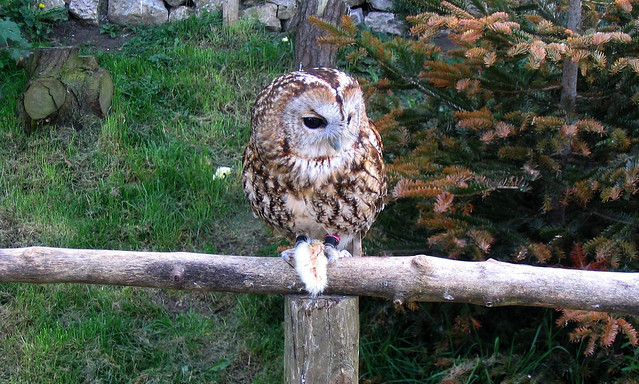Words for owls in Celtic languages.
| Old Irish (Goídelc) | ulchobc(h)án / ulchubc(h)án = owl |
|---|---|
| Irish (Gaeilge) | ulchabhán / ulcachán = (barn) owl (Tyto alba) ulchabhán donn = tawny/brown owl (Strix aluco) ulchabhán réisc / ulchabhán chluasgearr = short-eared owl (Asio flammeus) |
| Scottish Gaelic (Gàidhlig) | ullaid [ul̪ˠadʲ] = (barn) owl ullaid-sgreuch = barn owl |
| Manx (Gaelg) | hullad = owl hullad vane / hullad soailt = barn owl hullad ghoan = tawny/brown owl hullad eairkagh = long-eared owl (Asio otus) hullad ny gurreeyn = short-eared owl |
| Cornish (Kernewek) | oula / ula = owl ula gwynn = barn owl ula kernek = long-eared owl ula gwenn = short-eared owl |
Etymology: probably of imitative origin
| Irish (Gaeilge) | cailleach oíche = barn owl |
|---|---|
| Scottish Gaelic (Gàidhlig) | cailleach-oidhche [kal̪ʲəxˈɤ̃ĩçə] = (tawny) owl, spiritless fellow cailleach-oidhche gheal = barn owl |
| Manx (Gaelg) | caillagh oie = barn owl, white owl |
Etymology: means literally “night crone/witch”
| Irish (Gaeilge) | ceann cait = long-eared owl |
|---|---|
| Manx (Gaelg) | kione kiyt = long-eared owl |
Etymology: means literally “cat head”
| Proto-Celtic | *kawannos = owl |
|---|---|
| Gaulish | *cauannos = owl |
| Scottish Gaelic (Gàidhlig) | comhachag [kõ.əxag] = owl comhachag-ruadh / comhachag-dhonn = tawny/brown owl comhachag-adharcach = long-eared owl comhachag-chluasach = short-eared owl |
| Welsh (Cymraeg) | cuan = owl |
| Cornish (Kernewek) | kowan [ˈkɔwan / ˈkɔwɐn] = owl |
| Old Breton | couann = owl |
| Breton (Brezhoneg) | kaouenn = owl kaouenn penn-tev = tawny/brown owl |
Etymology: from the Proto-Indo-European *kaw- (owl) – of imitative origin. Related to the Latin căvannus (night owl) [source].
| Welsh (Cymraeg) | tylluan [təˈɬɨ̞.an / təˈɬiː.an] = owl tylluan wen / tylluan ysgubor = barn owl tylluan frech / tylluan felynddu / tylluan y coed / tylluan lwyd / tylluan rudd / y dylluan fig = tawny/brown owl |
|---|---|
| Breton (Brezhoneg) | toud penn-kazh = long-eared owl toud-lann = short-eared owl |
Etymology: probably of imitative origin. I’m not sure if these words are cognate.
| Breton (Brezhoneg) | grell voutin = barn owl |
|---|
Etymology: unknown
| Welsh (Cymraeg) | gwdihŵ [ɡʊdɪˈhuː] = owl gwdihŵ frech / gwdihŵ goch = tawny/brown owl |
|---|
Etymology: probably of imitative origin
The owls included here are commonly found in Celtic-speaking lands. Other types of owls are available.
Sources: Wiktionary, Am Faclair Beag, MacBain’s Dictionary, In Dúil Bélrai English – Old-Irish Glossary, teanglann.ie, On-Line Manx Dictionary, Geiriadur Prifysgol Cymru, Gerlyver Kernewek, Dictionnaire Favereau, TermOfis










